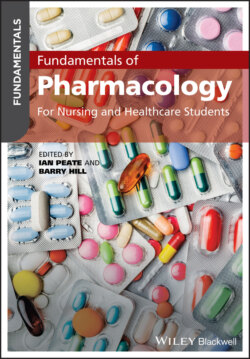Читать книгу Fundamentals of Pharmacology - Группа авторов - Страница 19
Patient assessment
ОглавлениеWhen a patient is admitted to a healthcare facility (regardless of the setting), an initial assessment must be undertaken which has to include a detailed medication history. Information must be obtained from the patient (and, if appropriate, the patient's family), and information may also be collected from the patient's pharmacy and/or the general practitioner with their permission. In addition, any medications that have been brought in by the patient must be documented and kept in a safe location. At all times, local policy and procedure must be adhered to.
Assessment is the first stage in the planning of care, it is associated with the process of gathering information in order to make decisions about appropriate interventions (Ballantyne, 2015). During the assessment stage, the patient's story is listened to and the nurse–patient relationship is strengthened, ensuring that the patient is truly at the heart of all that is done. The nursing process is a systematic, developing, dynamic approach, that is cyclical in nature, and as such assessment must not be seen as a one‐off activity: it is not linear by nature; it is ongoing.
When assessing needs – and this also relates to assessing needs and the use of medications – data is gathered, analysed and organised, and the data is acted upon as critical thinking skills and the mobilisation of resources are used to achieve goals and outcomes that have been set, when possible, in partnership with the patient (Stonehouse, 2017).
Having undertaken patient assessment, a diagnosis is formulated, a plan of care is devised relating to the needs that have emerged following assessment, care is provided using a holistic approach, and finally all that has been done is evaluated to establish efficacy. See Figure 1.1: a systematic approach to care.
The safety and success of medicines administration is based on ongoing nursing assessment. All healthcare providers have a professional duty to ensure that they offer care that is safe and effective (Nursing and Midwifery Council (NMC), 2018b,2018c). As well as professional obligations, there are also requirements that must be given due diligence in order to ensure that patient safety is paramount. There is much legislation regarding medicines (see Chapter 3), and the nurse must also adhere to the laws of the country in which they are working.
The skills of assessment require the nurse to undertake a physical and psychological assessment of the person's needs. The nurse obtains a patient history and carries out a physical examination (if required) to identify needs. There are a number of components associated with assessment. Assessment requires the nurse to:
observe the patient
undertake a clinical examination
gather data
communicate
undertake various measurements.
Figure 1.1 A systematic approach to care provision.
Clinical judgment is used to determine the type of assessment required. It is important during the assessment phase to ensure the use of a framework to guide the process as this will help to provide structure and order.
The NMC has suggested that newly qualified nurses will be able to go on a prescribing course soon after their initial pre‐registration education; in order to do this, there is a need to include more prescribing theory in undergraduate nursing programmes allowing nurses to prescribe from a limited formulary. It is important to note that nurses will not prescribe at the point of entry to the register (when their pre‐registration nurse education is complete), but will complete a post‐registration qualification in order to prescribe (NMC, 2018b).
All nursing professionals must practise in line with the requirements of The Code (NMC, 2018a), the professional standards of practice and behaviour that nurses, midwives and nursing associates are required to uphold.
